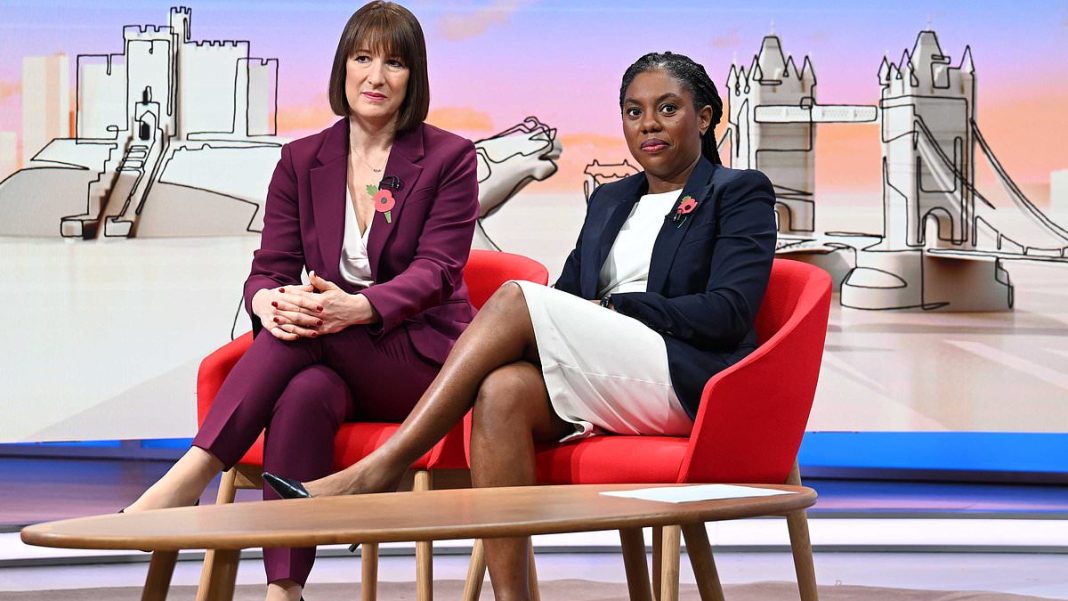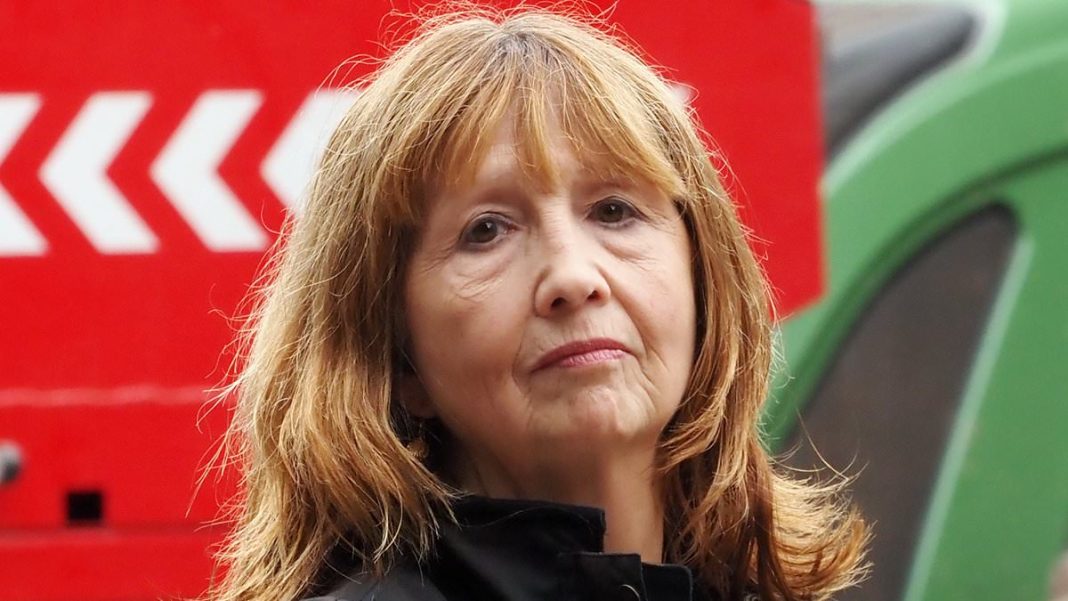Kemi Badenoch today slammed Rachel Reeves for boasting about being the first female Chancellor.
The new Tory leader laid into Ms Reeves as they appeared on the BBC together, saying it was ‘astonishing’ how much she talked about her milestone.
Signalling her combative style will continue in charge of the Opposition, Ms Badenoch said taking charge of No11 was a ‘very, very low glass ceiling’ and ‘nowhere near as significant as what other women in this country has achieved’.
The barb came as Ms Badenoch played down her own piece of history, after becoming the first black leader of a major UK political party.
In a series of eye-catching interventions the day after winning the Tory crown Ms Badenoch:
- Insisted she will make the Tories a meritocracy but admitted forging her shadow cabinet will be ‘tricky’ after a slew of big beasts announced they do not want to serve;
- Said the Partygate scandal that consumed Boris Johnson’s administration was ‘overblown’ but said the Conservatives lost the trust of the public;
- Argued that taxes can be reduced without slashing public services, and committed to reverse Labour’s move to add VAT to private school fees.
Asked whether she was pleased people were noting the achievement, Ms Badenoch said: ‘I think that the best thing will be when we get to a point where the colour of your skin is no more remarkable than the colour of your eyes or the colour of your hair.
‘We live in a multi-racial country. That’s great but we have to make sure it doesn’t become something divisive…’
She added: ‘What I don’t want is for that to be the thing that ends up being talked about.’
Turning her fire on the Chancellor, Ms Badenoch suggested becoming first woman Chancellor mattered less than the three Tory female leaders who had become Prime Minister.
‘I find it astonishing that Rachel Reeves keeps talking about how she’s the first female chancellor which in my view is a very very low glass ceiling in the Labour Party that she may have smashed – nowhere near as significant as what other women in this country have achieved,’ she said.
Ms Badenoch was declared the winner of the long-running battle to succeed Rishi Sunak yesterday, seeing off a challenge from former immigration minister Robert Jenrick.
However, questions have been raised about her mandate after turnout was relatively low and her margin of victory was smaller than previous leaders.
In her speech at the announcement yesterday, Ms Badenoch said it was time to ‘tell the truth’ about where things had gone wrong for the Tories.
Pressed on the BBC’s Sunday With Laura Kuenssberg programme what had gone wrong with Boris Johnson’s government, Ms Badenoch said: ‘I thought he was a great prime minister, but there were some serious issues that were not being resolved and I think that during that tenure the public thought that we were not speaking for them or looking out for them, we were in it for ourselves.
‘Some of those things I think were perception issues, a lot of the stuff that happened around partygate was not why I resigned.
‘I thought that it was overblown. We should not have created fixed penalty notices, for example. That was us not going with our principles.’
Stressing that the public was ‘not wrong to be upset about partygate’, she said: ‘The problem was that we should not have criminalised every day activities the way that we did.
‘People going out for walks, all of them having fixed penalty notices, that was what ended up creating a trap for Boris Johnson.’
Ms Badenoch said Britain needs fundamental change to stop getting ‘poorer’.
‘I think that there are hard truths not just for my party, but for the whole country,’ she said.
‘And that is that as a country we are getting poorer, we are getting older, we are being out-competed by many other competitor countries, and we need to look at how we can reorganise our economy to be fit for the future, not just doing what we always used to.
‘And I think that there is an exciting challenge there. I’m very optimistic about what we can do.
‘But simply just saying things and making promises to the whole country without knowing how you’re going to deliver them, as we did on Brexit, as we did on net zero, I don’t think is building trust.’
But the Tory leader denied that reducing the tax burden mean reducing public services.
‘If we start from the assumption that we can just tax and borrow our way through, we will keep getting poorer, and that is what has been happening,’ she said.
‘And we were a part of that, so when you ask what we did wrong, these were some of the things that I think that we got wrong.
‘I think the tax burden was too high under the Conservatives. That doesn’t mean that we have to cut public services, it means that we have to look at how we are delivering public services, and a lot of what government does is not even public services.’









